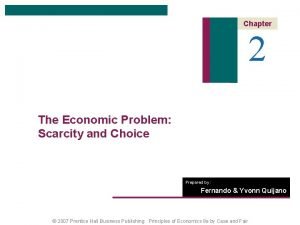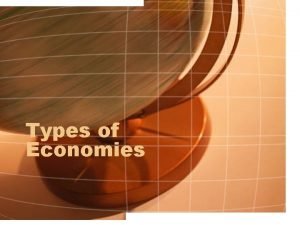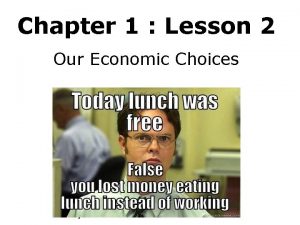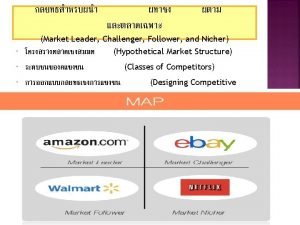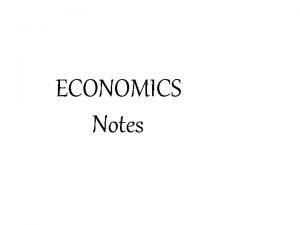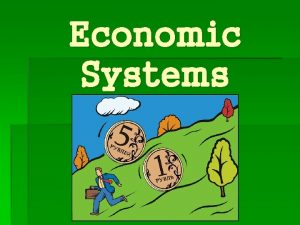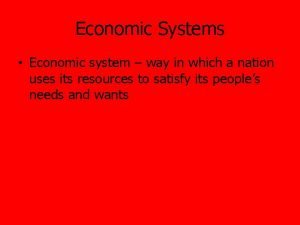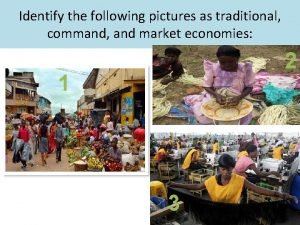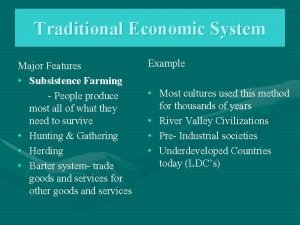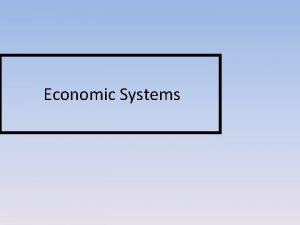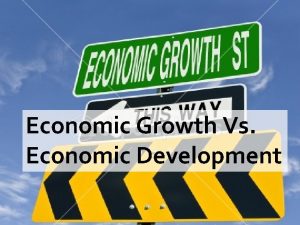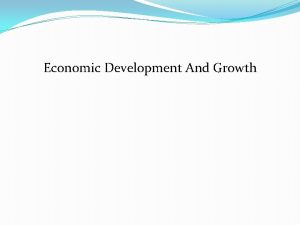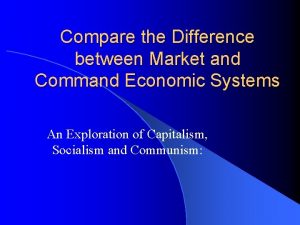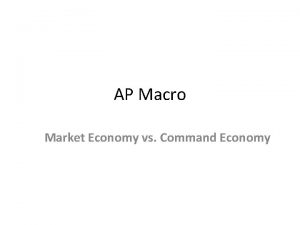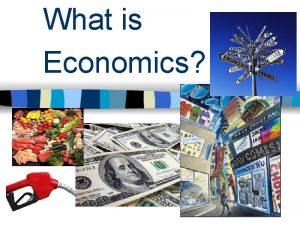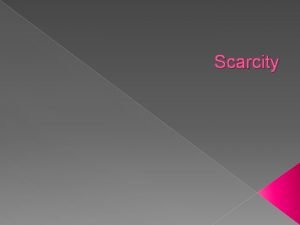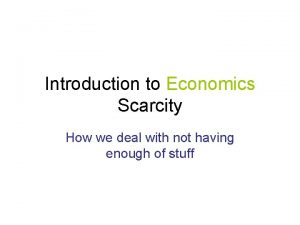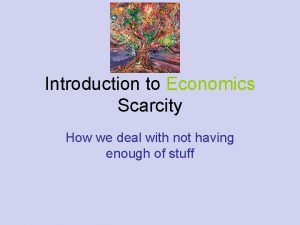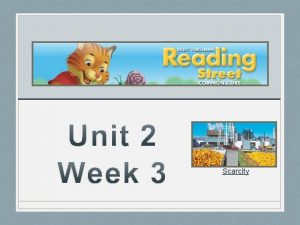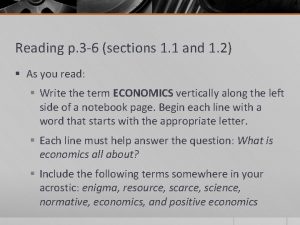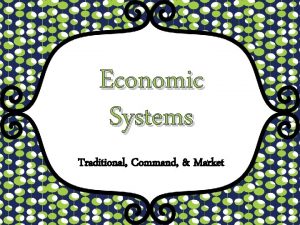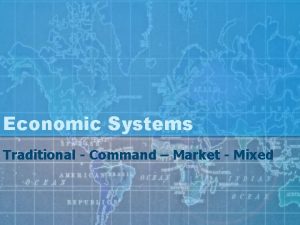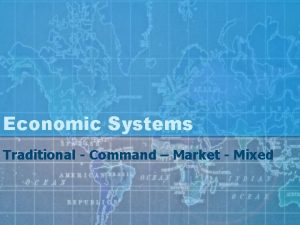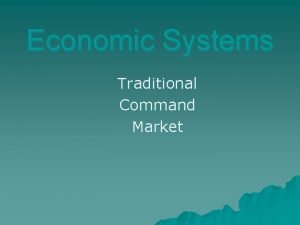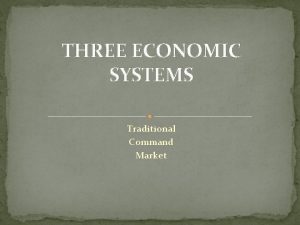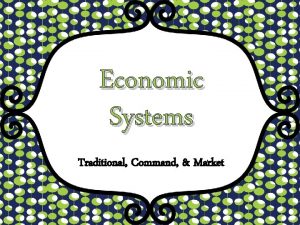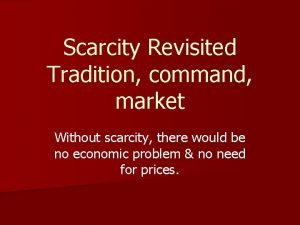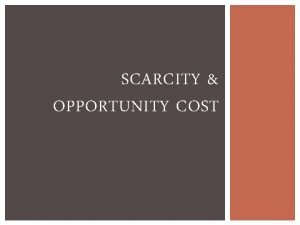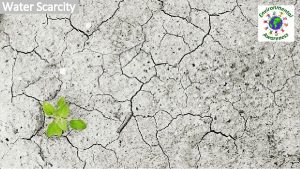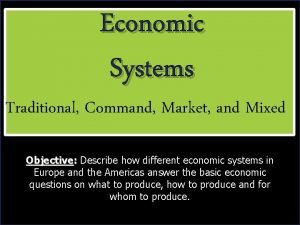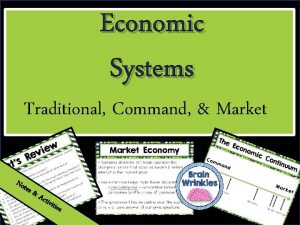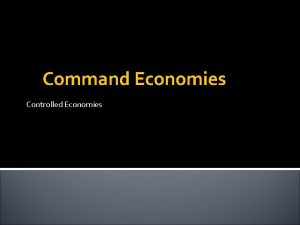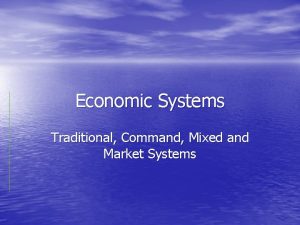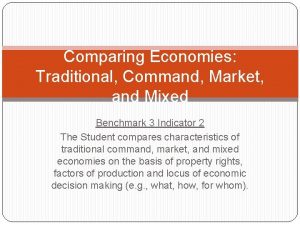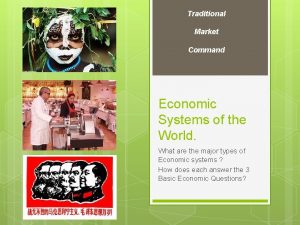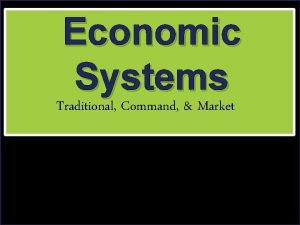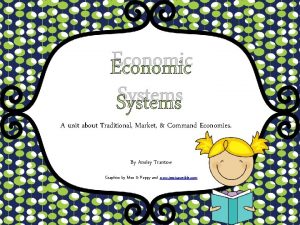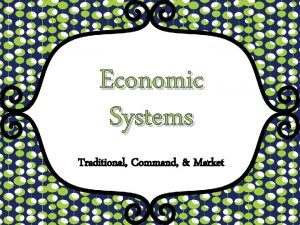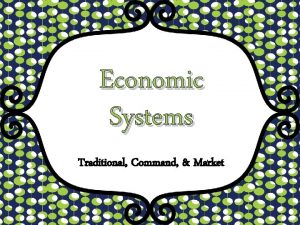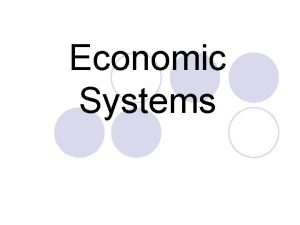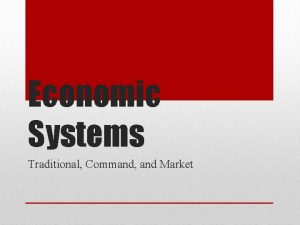Economic Systems Traditional Market Command Economies Scarcity is



























- Slides: 27

Economic Systems Traditional, Market, & Command Economies.

Scarcity is The Root of Economics. . . • There is not a single country in the world that has an abundance of all the resources that its people need/want. • Scarcity = the limited supply of something • Because of this, countries must make a plan of how to use these limited resources. • This “plan” is called an… Economic System!

Three Little Questions • When developing the economic plan, each country must ask three basic economic questions: 1. What goods/services will be produced? 2. How will goods/services be produced? 3. Who will consume the goods/services? The way a country answers these questions determines what kind of economic system it will have: Traditional Command Market

Traditional Economy • All economic decisions are based on customs, traditions, & beliefs of the past. • People will make what they always made & do the same things their parents did. • The exchange of goods is done through bartering. • Bartering = trading without using money • Some Examples: villages in Africa & South America, the Inuit in Canada, Aborigines in Australia

Traditional Economy Let’s see how a traditional economy fits in with the 3 economic questions… 1. What goods/services will be produced? • People follow tradition & make what their ancestors made. 2. How will goods/services be produced? • People produce goods the same way that their ancestors did. 3. Who will consume the goods/services? • People in the village who need them.

Command Economy • All economic decisions are made by the government. • The government owns most of the property, sets the prices of goods, determines the wages of workers, plans what will be made…everything. • This system has not been very successful. More and more countries are abandoning it.

Command Economy • This system is very harsh to live under; because of this, there are no PURE command countries in the world today. • Some countries are close: Cuba, former Soviet Union, North Korea, former East Germany, etc. • All of these countries have the same type of government: Communist! The government is in control of everything.

Command Economy Let’s see how a command economy fits in with the 3 economic questions… 1. What goods/services will be produced? • Government decides what will be produced. 2. How will goods/services be produced? • Government decides how to make them. 3. Who will consume the goods/services? • Whoever the government decides to give them to.

Market Economy • Economic decisions are made based on the changes in prices that occur as buyers & sellers interact in the market place. • Free enterprise helps make these decisions. • Free Enterprise = competition between companies (shifts prices of goods/services) • The government has no control over the economy; private citizens answer all economic questions.

Market Economy Let’s see how a command economy fits in with the 3 economic questions… 1. What goods/services will be produced? • Businesses (owned by private citizens) based decisions on supply & demand free enterprise. (AKA $!) 2. How will goods/services be produced? • Businesses (owned by private citizens) 3. Who will consume the goods/services? • Consumers

Market Economy • In a truly free market economy, the government would not be involved at all. Scary… • There would be no laws to make sure goods/services were safe. *Food! Medicine! • There would be no laws to protect workers from unfair bosses. • Because of this, there are no PURE market economies, but some countries are closer than others. • Some Examples: US, UK, Australia, etc.

Hmmmm. . . • Since there are no countries that are purely command or purely market, what does that make them? Com-ket? Mark-mand? • Ha! Most democratic countries have some characteristics of both systems, so we keep it simple and call them: Mixed! • Of course, most countries’ economies are closer to one type of system than another…

The Economic Continuum Command Cuba Market Russia Germany UK US Australia

Traditional 1. What goods/services will be produced? 2. How will goods/services be produced? 3. Who will consume the goods/services? Command Market

Show ME! The government makes ALL economic decisions.

Show ME! If your parents were peanut farmers, then you would be a peanut farmer also.

Show ME! Most democratic countries are this.

Show ME! Cuba is closest to having this type of system.

Show ME! Business (ran by private citizens) determine what goods/services are produced and how they will be made.

Show ME! Bartering is used.

Show ME! Communist countries are closely related to this.

Show ME! Businesses make economic decisions, but the government regulates them to make sure they’re safe/fair.

Show ME! Australia is close to this.

Let’s Review 1. 2. 3. 4. 5. 6. 7. 8. 9. 10. What are three basic questions that every economic system must answer? What are three economic systems? The former Soviet Union was an example of what kind of economic system? Which economic system allows for the most individual freedom? In which economic system does the government have the most control? In which economic system do individuals do things based on customs & beliefs? What is the economic system of most communist countries? How do traditional economies exchange goods? Which country is closest to a true Market economy? Most democratic countries have which type of economic system?

Role Play Terms • Bartering, traditional economy, customs/beliefs, ancestors, past • Market economy, free enterprise, businesses make what they want & how they want it • Command economy, strict government, no individual choice for what to make/buy • Mixed economy, democracy, private citizens have own business & government regulates them

Role Plays • Look at your group’s vocabulary words. • Develop a skit that shows the term “in action”. This means, don’t just define the word—you have to act out how it works in a real world situation.

Important Book You are going to create an Important Book about Economic Systems based on The Important Book by Margaret Wise Brown. Each page will have THE MOST IMPORTANT THING TO KNOW about the system, followed by 2 -3 additional facts. Illustrate & Color your book. Don’t forget a cover page! Follow this format SYSTEM NAME The important thing about (System) is… --1 st fact --2 nd fact --3 rd fact But the most important thing about (System) is (write the most important thing to know).
 Definition of scarcity in economics
Definition of scarcity in economics The economic problem of scarcity
The economic problem of scarcity Traditional economy advantages
Traditional economy advantages Economic systems lesson 2 our economic choices
Economic systems lesson 2 our economic choices Market leader follower challenger nicher
Market leader follower challenger nicher International market segmentation
International market segmentation Is saudi arabia a command economy
Is saudi arabia a command economy Economic system mixed
Economic system mixed What is command economic system
What is command economic system Traditional economic system picture
Traditional economic system picture Traditional economic system example
Traditional economic system example Features of economic system
Features of economic system Traditional economic system example
Traditional economic system example Economic growth vs economic development
Economic growth vs economic development Prof. meier and baldwin
Prof. meier and baldwin Similarities between market and command economy
Similarities between market and command economy Market vs command economy
Market vs command economy People with all their efforts, abilities, and skills
People with all their efforts, abilities, and skills What is economics
What is economics Scarcity lesson plan
Scarcity lesson plan Opportunity costs def
Opportunity costs def Causes of scarcity
Causes of scarcity Scarcity, choice and opportunity cost example
Scarcity, choice and opportunity cost example Scarcity
Scarcity Scarcity forces tradeoffs symbol
Scarcity forces tradeoffs symbol Take home pay
Take home pay Entrepreneurship 3209
Entrepreneurship 3209 Scarcity
Scarcity

